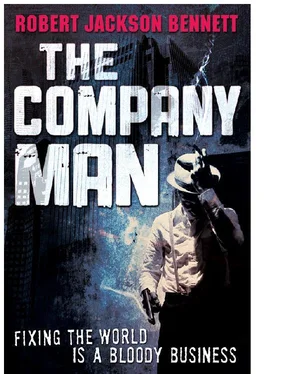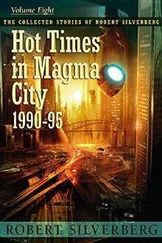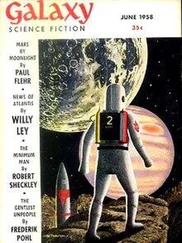Robert Bennett - The Company Man
Здесь есть возможность читать онлайн «Robert Bennett - The Company Man» весь текст электронной книги совершенно бесплатно (целиком полную версию без сокращений). В некоторых случаях можно слушать аудио, скачать через торрент в формате fb2 и присутствует краткое содержание. Жанр: Триллер, на английском языке. Описание произведения, (предисловие) а так же отзывы посетителей доступны на портале библиотеки ЛибКат.
- Название:The Company Man
- Автор:
- Жанр:
- Год:неизвестен
- ISBN:нет данных
- Рейтинг книги:3 / 5. Голосов: 1
-
Избранное:Добавить в избранное
- Отзывы:
-
Ваша оценка:
- 60
- 1
- 2
- 3
- 4
- 5
The Company Man: краткое содержание, описание и аннотация
Предлагаем к чтению аннотацию, описание, краткое содержание или предисловие (зависит от того, что написал сам автор книги «The Company Man»). Если вы не нашли необходимую информацию о книге — напишите в комментариях, мы постараемся отыскать её.
The Company Man — читать онлайн бесплатно полную книгу (весь текст) целиком
Ниже представлен текст книги, разбитый по страницам. Система сохранения места последней прочитанной страницы, позволяет с удобством читать онлайн бесплатно книгу «The Company Man», без необходимости каждый раз заново искать на чём Вы остановились. Поставьте закладку, и сможете в любой момент перейти на страницу, на которой закончили чтение.
Интервал:
Закладка:
“It’s not how I remember it,” he said.
“Remember what?”
“The city. It’s changed so much, from when I was little.”
“How old were you when you moved here?”
He looked up at her. “I didn’t. I was born here.”
She blinked, then said, “Do you know, I think you may be the only native Evesdener I’ve ever met.”
He laughed. “I’m not surprised,” he said. “This is a mutt city, made of other cities and other countries. But it used to be a city. A real city.”
“When?”
“I don’t know. When I was a kid, I guess.” He struggled to describe it to her. How the city had once been something new, genuinely new, new with promise, not new with perversion, as this late Evesden was. It had been the foundation of something, not a tumorous buildup of growth. It was difficult for him to say exactly when he had realized that it had failed, though.
She found he kept returning to one particular day, the day his father closed his carpentry shop. Like all the buildings in Evesden the shop had been relatively new, he told her, but in comparison to everything else his father’s shop seemed a great old thing, solidly built of huge shafts of wood, with dark, polished eaves and an eternal scent of polish and smoking timber. It had seemed larger than a church back then, dark and cavernous with strange tools standing among the shadows. And somehow his father had seemed bigger then, too. Garvey still remembered him as a huge man, taller than any other he had ever seen, with a broad back and knobby, darkened hands, hands that were a plum-red like they had been soaked in wine. His father and the shop seemed like emissaries of an older age then, silent and wordless except for the sounds of work and progress. Even when the home-building companies began to take hold and started choking out the little shops his father had soldiered on, indifferent to the rise and fall of those strange, abstract companies. Yet they did not fall, only rise. They rose until they ruined the shop, eating up customers until the gnarled old church went silent, tool by tool, voice by voice. And on the day his father had locked up and doomed the shop, both he and the shop seemed to have lost something. It was not a great, mysterious building made of dark timber. In fact it seemed little more than a shack then, and a shoddily built one at that. And his father no longer seemed so large and mysterious. He seemed like a working man who had not been smart enough to realize when the world was eroding beneath him. And then his father had gone home and uncapped a bottle of whisky and sipped it down inch by inch, watery red eyes fixed on nothing, and he’d shaken his head and said, “It’s gone now. It’s all gone.”
And that was when Garvey had known. Had realized he had known all along. That sometime in the blossoming progress of this city there had come a wound that had sent it all awry, and it could only throw on messy layer after messy layer, like a mad pearl growing within the lips of the sound, until it ate itself alive.
He often got that feeling. That once something had happened that had sent the whole world reeling. Some great violation or change, long ago. Maybe even before Evesden. He wasn’t sure. But he had felt all his life that he was struggling in the wake of it.
As he described it to her she suddenly remembered the letter Hayes had read to her in Skiller’s apartment, and the little lost boy and his dead father, and she wondered what Garvey saw in his case with the man in the canal. Perhaps he saw that same familiar wound that had sent his life in the direction it’d come, only now there was a chance, however slight, to correct it.
CHAPTER TWENTY-TWO
Hayes slept in five-minute bursts. He had trained himself to do it long ago, and there in the empty cold shop the gift returned slowly. For the past two days he had lived in a swimming dreamworld, fatigue eroding every one of his senses. But still he watched. And, in a way, the silence and loneliness were pleasant. His mind had not been so clear in weeks.
When the storm rolled in he piled blankets about himself on his perch. He ignored his shivering and hunkered down more and sucked on the end of a pencil. He badly wanted a cigarette but would not risk the flame.
He was not sure when he noticed the man. Time had become strange to him as the sun shifted behind the overcast. But he had been staring at the pattern of the crowd for hours and had come to know the traffic and the loitering places, so when one man walked out of one alley and crossed before the building face and walked into yet another alley to examine something on the ground, Hayes knew there was something wrong. Through the fog and the condensation of the glass Hayes saw he was short with a gray coat and a smudged bowler, but could make out nothing more.
He watched the gray coat. Saw him look closer at the thing on the ground, then look at the street and the buildings above and pick the thing up and toss it away. It was half of a shoe, sodden and wet. The man wiped his hands on his coat and stood in the shelter of the alley and put his hands in his pockets and casually rocked back and forth.
“You,” said Hayes from his perch, “are fucking terrible at this.”
He gauged that the man in the gray coat would stay in the alley for a little less than five minutes. He slipped down to the bottom floor of the shop and watched him from behind a ragged sheet that had been left hanging. The gray coat sidled out toward the lip of the alley and huddled below an awning in the sleet. Then he walked out quickly, crossing to Hayes’s warehouse and dodging through the cars and the cabbies and the streams of soaking people. He slowed as he came to Hayes’s door, where he turned about and walked backward the rest of the way, eyes roving and clouds of breath forming a trail like the smokestack of a train. Then he ducked down and slid something below the door and hurried off west.
Hayes put on a thick black coat and boots and a riding cap and headed out into the rain after him. He marked the gray coat carefully in the street and strained to keep hold of him. Crowds swarmed about them as his quarry headed north on Embrage and then west on 112th and then south on Dowers. The figure slipped among street criers and huddled bands of the homeless and once a train of passing nuns, black and white like the keys of a piano. He paused at every other corner to inspect something on the ground and sneak glances over his shoulder. Each time he went through this inept process Hayes would pull his face down into his collar and merge with the nearest group of people. If they noticed him they did not say so. Perhaps on rainy cold days such as these the water blended people together until they could not tell themselves apart.
The gray coat came to a trolley station and he swung himself down the twisting iron staircase to the tunnels below. Hayes ambled up to the stairway and passed by while looking down. He did not see the man waiting so he quickly bought a newspaper and pretended to read it to hide his face. Then he walked to the stairwell and descended in a brisk trot and turned sharply left at the floor and kept going. Warm air and the roar of a distant trolley swallowed most of his senses. A vagrant sat by the foot of the stairs, hands cupped for change. He reached out to Hayes, saying, “I am a messenger, sent from afar. Please, you must listen to me. You must listen. You must…”
Hayes ignored him. His eyes stayed vaguely fixed on the print of the newspaper, scanning the crowd for that streak of light gray. He walked around in a quick loop and spotted the man walking east along the tunnel, then over one of the trolley bridges and down west to Westbank. Hayes followed and let the newspaper fall as he did so. It would be hard to lose him now. The trolley stations were mostly abandoned in the wake of the Bridgedale slaughter.
Читать дальшеИнтервал:
Закладка:
Похожие книги на «The Company Man»
Представляем Вашему вниманию похожие книги на «The Company Man» списком для выбора. Мы отобрали схожую по названию и смыслу литературу в надежде предоставить читателям больше вариантов отыскать новые, интересные, ещё непрочитанные произведения.
Обсуждение, отзывы о книге «The Company Man» и просто собственные мнения читателей. Оставьте ваши комментарии, напишите, что Вы думаете о произведении, его смысле или главных героях. Укажите что конкретно понравилось, а что нет, и почему Вы так считаете.












